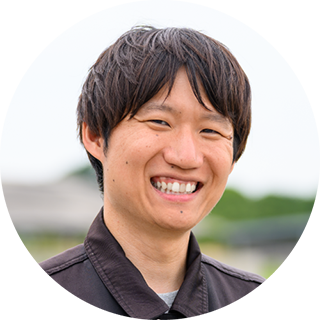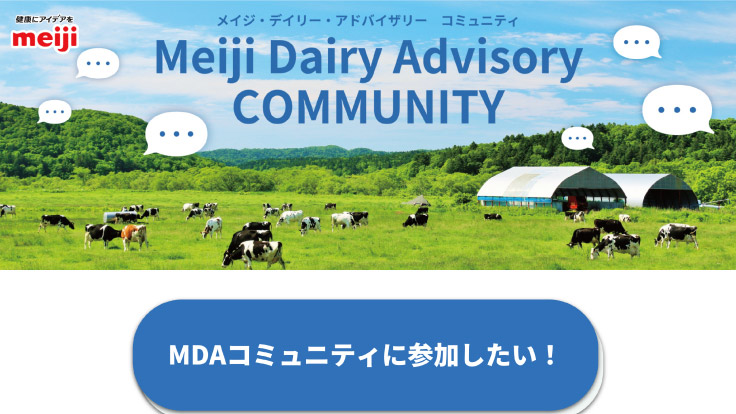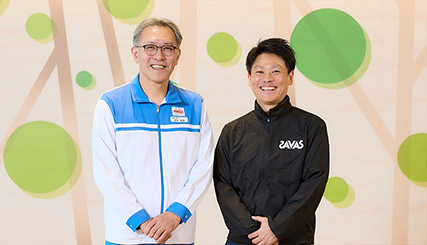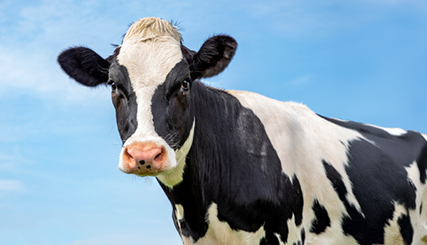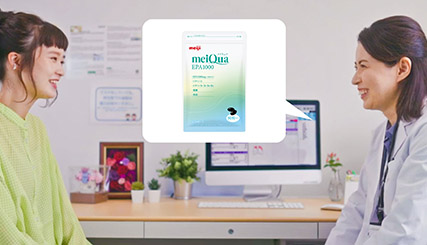Japan's dairy industry is grappling with serious challenges, from an aging population and labor shortages to a lack of successors.
To help ensure the long-term production of raw milk—and maintain a steady supply of essential dairy products—the Meiji Group launched the Meiji Dairy Advisory (MDA) initiative. Through MDA, Meiji supports Japanese dairy farms working side by side with farmers to address key management issues. We spoke with Yuki Motomura of Meiji Co., Ltd., who leads these efforts.
Without action, dairy farming in Japan could disappear
Raw milk production in Japan has been on the decline since peaking in 1996. Behind this trend is a shrinking number of dairy farmers, driven by aging, a lack of successors and workers, and rising production costs.
If left unaddressed, dairy farming could vanish from Japan altogether—and as a dairy manufacturer, Meiji may one day be unable to deliver milk and dairy products. In 2015, faced with this pressing concern, the Meiji Group began asking itself what it could do to help.
As traditional family-run farms have dwindled and more operations hire outside staff, many farms now face new management challenges, from staff training to team building. In response, Meiji began focusing on farm support from a human resources perspective. Drawing on the expertise of Danish specialists—Denmark being one of the world's leading dairy countries—Meiji launched the Meiji Dairy Advisory (MDA) program in 2018. The goal: to foster both personal development and better business management in Japan's dairy sector.
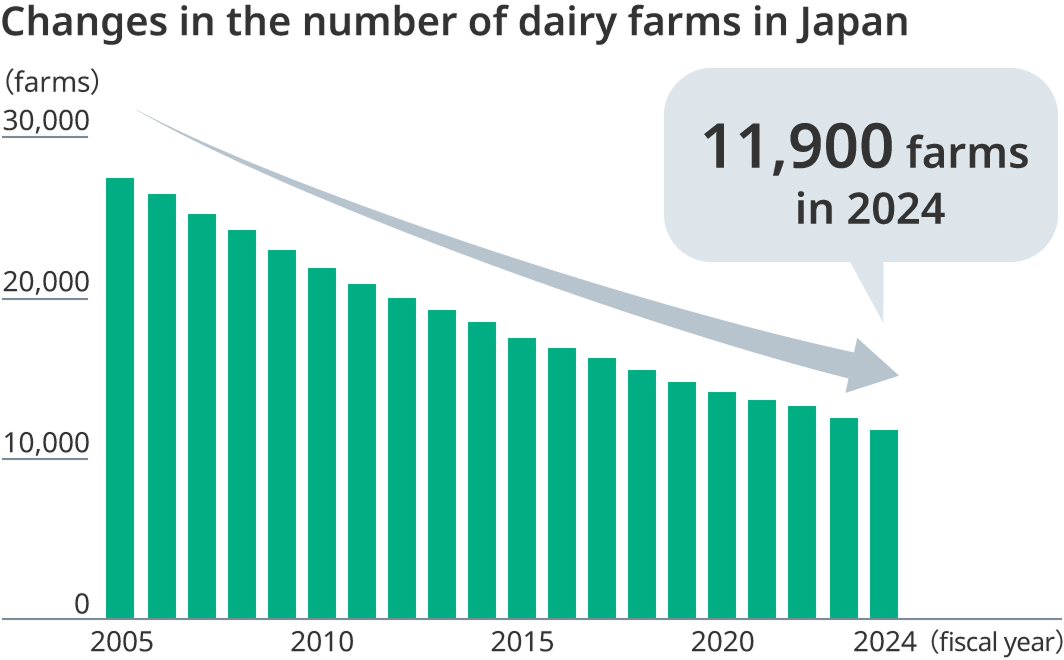
Partnering with farms to solve problems together
Motomura sees supporting dairy farmers as part of Meiji Group's core mission.
"We're only able to deliver milk and dairy products to consumers because dairy farmers produce raw milk," he explains. "So, the challenges they face are challenges for Meiji as well. Through MDA, our staff visit farms across Japan with a strong sense of purpose, working side by side with farmers to solve on-the-ground issues."
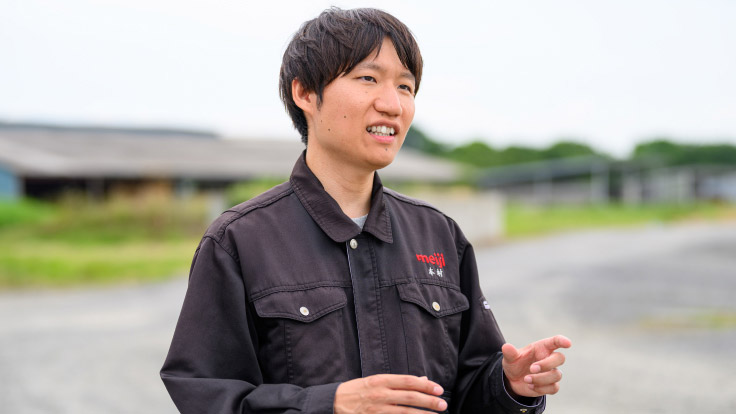
Motomura explains that the challenges facing farms are also challenges for the Meiji Group.
The range of challenges is broad. These include standardizing and improving work processes, training future leaders and successors, educating technical intern trainees from abroad, and helping implement human resource systems. In recent years, MDA has also supported large-scale farms in building more functional organizational structures—especially as they adopt milking robots and digital technology.
"Our aim is to help farm managers run more profitable operations, and to make farms better places to work for staff," says Motomura. "We're in it together, supporting the goals of each farm while continuously growing ourselves. At Meiji, we hold monthly online sessions for our staff to deepen their understanding of dairy management, share experiences, and visit farms across the country for hands-on learning."
Fostering peer learning among farm teams
MDA's support goes beyond individual farm management—it also focuses on creating opportunities for dairy farm staff to learn from one another. One such example comes from Ibaraki Town in Ibaraki Prefecture.
With labor shortages growing, more farms have begun hiring international technical intern trainees. But language barriers and training difficulties can make onboarding a challenge. To help, Meiji has been organizing joint study sessions for technical intern trainees in collaboration with several farms since 2024.
Each session features practical, easy-to-understand materials tailored for participants who may not be fluent in Japanese. Topics vary from cow behavior and common diseases to feed and breeding practices. Around 10 to 15 trainees from five farms gather to build their knowledge and deepen their skills in dairy farm work.
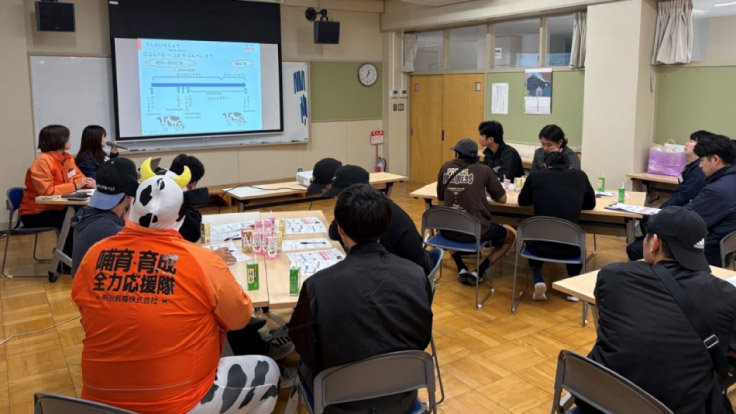
Study session for international technical intern trainees held in Ibaraki Town, Ibaraki Prefecture
Learning together with confidence and a smile—Planning and managing study sessions for technical intern trainees—
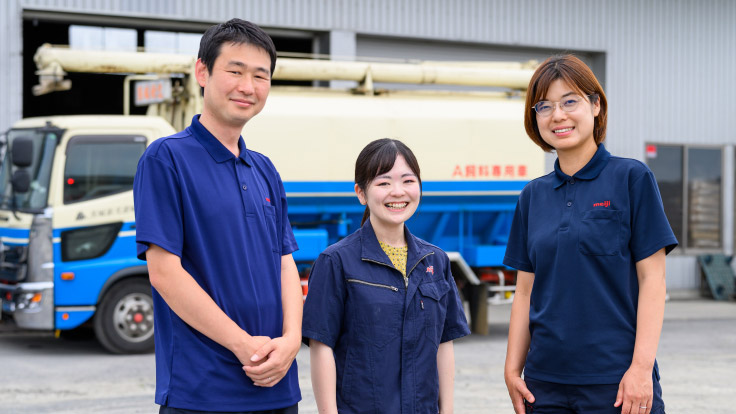
Rio Arimatsu (Center)Eastern Japan Team, Milk Procurement Dept., Meiji Co., Ltd.
Hiroaki Kitano (Left)Manager, Ibaraki Sales Office, Kanto Branch, MEIJI FEED CO., LTD.
Michiko Nagai (Right)Sales Promotion Group, Sales Dept., MEIJI FEED CO., LTD.
The idea for these sessions began when RAINBOW FARM, a farm employing four Indonesian technical intern trainees, shared their desire to further develop their trainees' skills. Recognizing that neighboring farms also employ trainees from Indonesia, we proposed organizing joint study sessions.
These sessions are built on the motto "be positive and have fun!", with a strong emphasis on peer interaction. During lectures, trainees are encouraged to ask questions and speak freely. In group discussions, we create space for each participant to think independently and exchange ideas. This friendly, hands-on approach not only deepens their knowledge, but also boosts their confidence.
By running these sessions, we've also gained insight into the broader challenges facing dairy farmers. This has enabled us to extend our support beyond the sessions themselves. Dairy farming comes with many hurdles, and we're committed to continuing this close, collaborative support—one farm and one region at a time.
Growing interest and motivation in dairy farming—Participating in a study session for technical intern trainees—
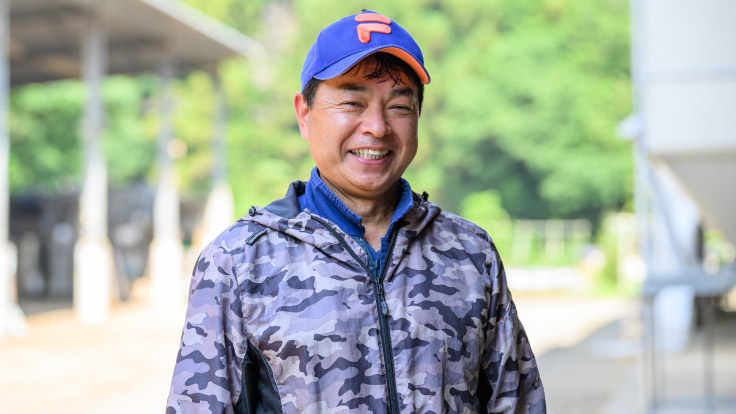
Mr. Toshihiro AmagaiRAINBOW FARM
Since joining the study sessions, the trainees have become more proactive: thinking independently, taking initiative, and seeking out ways to improve their work. As they've come to better understand the meaning and purpose behind their tasks, they've started experimenting with new methods on their own, leading to real growth in their skills.
Other participating farmers have noticed the change too, noting that "the trainees are more engaged" and "they ask more questions about cows and show a stronger desire to learn." This growing knowledge has clearly fueled a deeper interest in dairy farming, and a boost in motivation.
Dairy farming isn't something that can be done alone. It thrives on shared knowledge and mutual support. By exchanging ideas, experiences, and skills, we can all improve together. Looking ahead, we hope to work with the Meiji Group not only to continue these sessions for technical interns, but to develop new programs for young successors and other future leaders in dairy.
Building nationwide connections among dairy farmers
Beyond connecting local farms, MDA is also working to build a nationwide community of dairy farmers. Motomura explains why this is so important "Through our work with MDA, we've seen that many farms face similar challenges. By creating opportunities for farmers to connect and share their knowledge and experiences, we believe we can take a big step toward solving those challenges together."
Since 2022, MDA has hosted MDA MEETINGS—events where dairy farmers gather in person and online to exchange ideas. In 2024, the initiative expanded with the launch of MDA COMMUNITY, a membership-based website dedicated to farmers.
"We heard so many farmers say, ‘It's inspiring to hear stories from other farms,’" says Motomura. "That's why we created MDA COMMUNITY—to give farmers more opportunities to interact. It's a relaxed, friendly site where members can share updates about their operations, post photos, and chat about everyday topics. We're continuing to develop the platform to make it even more useful, including sending newsletters with tips on sustainable dairy farming."
Finding purpose in supporting dairy farming's future
Looking ahead, MDA aims to expand its support from isolated "points" to a broader, more interconnected "plane"—leveraging regional study sessions, MDA MEETINGS, and the MDA COMMUNITY platform. The initiative is also preparing to address broader social issues facing the dairy industry, including climate change, human rights, and animal welfare.
When asked what drives these efforts, Motomura emphasizes the connection to Meiji's broader mission: "Promoting MDA also contributes to the growth of the Meiji Group."
"For me personally," he adds, "there's deep fulfillment in working side by side with farms to tackle management challenges. As I've gotten to know dairy farmers more closely, my sense of responsibility—to ‘develop dairy farming together’ and to ‘continue delivering milk and dairy products to our customers’—has only grown. I believe everyone at Meiji involved in MDA feels the same."
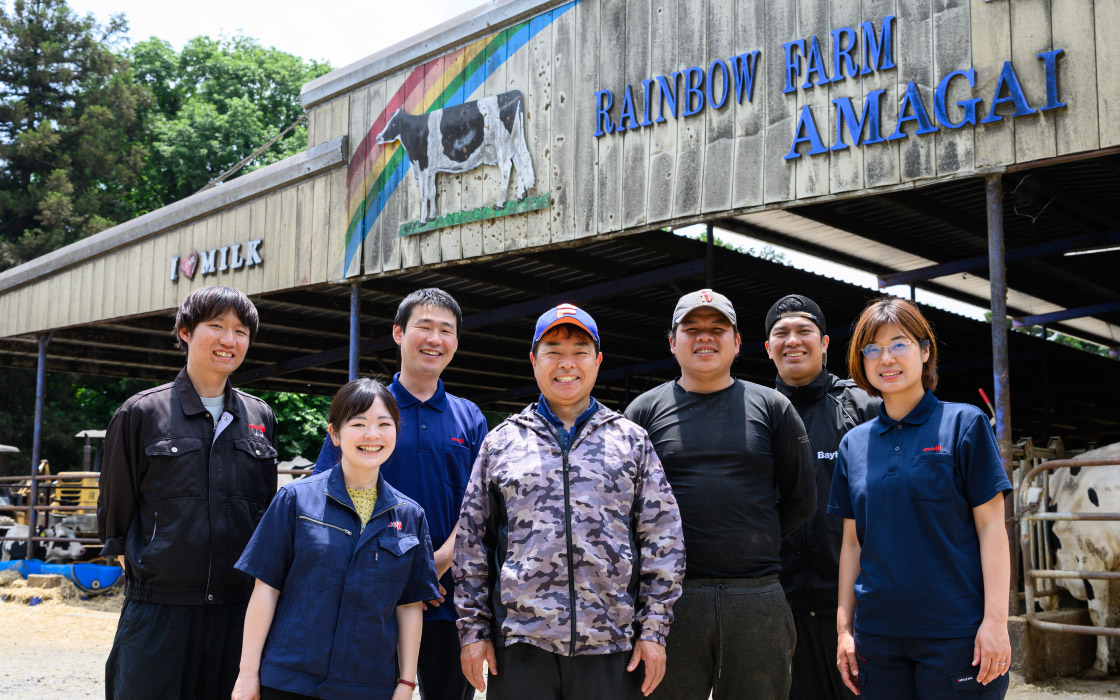
MDA is a team effort. From left: Motomura and Arimatsu (Meiji), Kitano (MEIJI FEED), Mr. Amagai, technical intern trainees Eni and Haji (RAINBOW FARM), and Nagai (MEIJI FEED).
